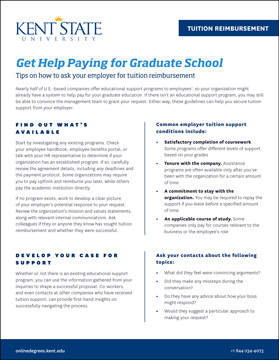With some experts estimating that 85 percent of the jobs available in 2030 have yet to be invented, it's clear that the job market is rapidly changing.1 In such a dynamic environment, staying competitive often requires further education. Graduate school, for many, is a crucial step toward preparing for the future of work. However, the cost can be a significant barrier. This is where employer tuition reimbursement comes in, playing a vital role in supporting employees' educational endeavors. Read on to explore how tuition reimbursement works, how it differs from tuition assistance, and how you can benefit from employer tuition support.
What Is Tuition Reimbursement?
Tuition reimbursement is an employee benefit where an employer agrees to pay for some or all of an employee's education expenses. In addition to helping employees further their education and enhance their skills, a tuition reimbursement program can also benefit the company. That’s why nearly half of U.S.-based companies offer tuition reimbursement or another form of educational support.2
Benefits to Employers
Offering educational assistance programs can be highly advantageous for employers. These programs help attract and retain top talent, as employees are more likely to stay with the company that has invested in their development. Additionally, companies benefit from having a more educated and skilled workforce, which can improve productivity and innovation. For example, the insurance company Cigna found a 129% return on investment from its education reimbursement program.3
How Does Tuition Reimbursement Work?
The IRS allows companies to provide a certain amount of educational assistance to employees tax-free annually, another reason tuition assistance programs are attractive to employers. You can find information on the current amount in IRS publication 970.4 Tuition reimbursement programs typically require employees to pay for their tuition upfront and then get reimbursed if they meet company criteria, such as earning satisfactory grades.
Typical Tuition Reimbursement Program Requirements
Here’s a quick overview of how employee tuition reimbursement programs generally operate:
- Eligibility: Employees must meet specific criteria, such as a minimum tenure and relevant coursework
- Application Process: Approval from supervisors or HR is often required before enrolling in courses
- Reimbursement Limits: Lifetime and annual limits on reimbursement amounts are common
- Commitment to Stay: Employees may need to commit to staying with the company for a set period to avoid repayment
Tuition Assistance vs. Tuition Reimbursement
Tuition assistance and tuition reimbursement programs are both employer-sponsored education benefits, but they operate differently. With a tuition assistance program, the employer pays tuition costs upfront, sometimes directly to the institution. In contrast, tuition reimbursement requires employees to pay their education costs first and get reimbursed after meeting specified conditions, such as earning satisfactory grades. Both programs aim to support employees' professional growth, but the structure and timing of financial support differ.
Tips for Maximizing Employer Tuition Benefits for Graduate School
To make the most of your employer's tuition reimbursement program, start by thoroughly understanding the program’s requirements and limits. Plan your courses to align with reimbursement caps and maintain the required grade point average. Additionally, communicate regularly with your HR department to ensure all your documents are in order. You can fully leverage the financial support available for your graduate education by strategically planning your coursework and maintaining good academic standing.
How to Ask Your Employer for Tuition Reimbursement
When approaching your employer to request tuition reimbursement, preparation is key. Kent State has developed a tuition reimbursement guide to help you present a winning proposal for help with your educational expenses. These are some of the topics the guide will help you with:
- Researching Company Policies: What to research about your company's existing tuition support programs, including the required paperwork
- Understanding Employer Requirements: Meeting common conditions for tuition reimbursement
- Building a Strong Case: How to develop a compelling proposal for tuition support
- Presenting Educational Details: How to discuss the degree program you plan to pursue
- Highlighting Employer ROI: How the new skills you gain in the program will benefit the company and provide a good return on the tuition reimbursement benefits

Download the Tuition Reimbursement Guide
Higher education is a powerful way to prepare for the dynamic future of work. Kent State’s online graduate programs in the College of Public Health offer flexible options that fit your life and help you confidently meet the future. Download the guide and start the conversation with your boss or human resources department. If you have questions about Kent State's programs, an admissions outreach advisor will gladly help.
- Retrieved on May 29, 2024, from delltechnologies.com/content/dam/delltechnologies/assets/perspectives/2030/pdf/Realizing-2030-A-Divided-Vision-of-the-Future-Summary.pdf
- Retrieved on May 29, 2024, from shrm.org/topics-tools/news/benefits-compensation/employers-leveraging-tuition-assistance-to-attract-retain-employees
- Retrieved on May 29, 2024, from luminafoundation.org/files/resources/talent-investments-pay-off-cigna-full.pdf
- Retrieved on May 29, 2024, from irs.gov/pub/irs-pdf/p970.pdf

